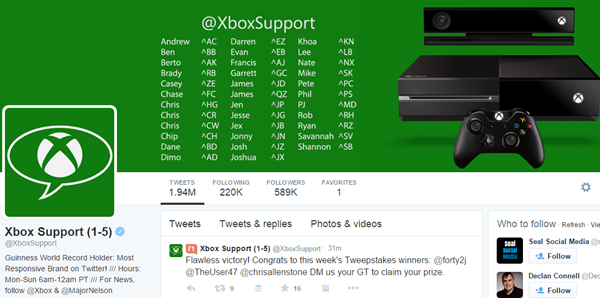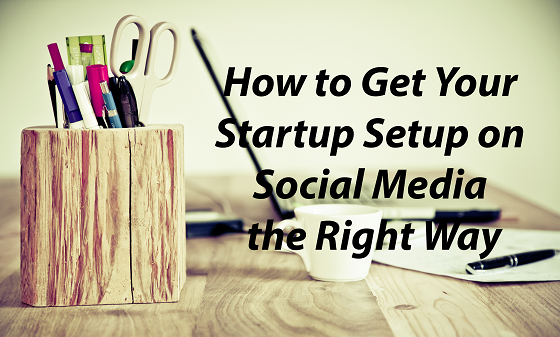Are you using social media to promote your startup? Would you like some tips on how to get your startup setup on social media the right way?
In the 21st century world where people can easily connect with each other online from another world, it’s essential that you have an effective social media business plan to get your startup off the ground. Since billions of people are connected on social media sites, you’re truly missing out if you’re not tapping these exceptional resources. Here are some surprising numbers on the total active users on popular social networks:
• Facebook: 1.41 billion
• Twitter: 288 million
• LinkedIn: 347 million
• Pinterest: 70 million
Clearly, these roll counts show that social media is a great way to gain exposure for your startup if you put in the effort to make a solid presence on it. From large corporate firms to mid-level agencies and brand new startups, social media allows businesses to leverage power in attracting more loyal clients or customers.
Thanks to their huge resources and manpower, larger companies often can easily keep pace with the latest social media changes to reap a good profit. However, small firms and startups typically struggle in this case due to a lack of money and business connections. That’s why I’ve decided to create the following guide with 7 tips on how to get your startup setup on social media the right way…
1. Create Your Social Media Strategy
Whether it’s big, medium, or tiny, every kind of business needs a social media strategy to compete within today’s digital market. Having an outstanding plan can help escort your social media campaigns to the highest height possible. First, you should think about your business motives and brainstorm how social media can help achieve them. You also need to examine the consistency of your brand across social networking channels. Always remember that every brand has a unique objective and yours should be different than others to stand out. Rather than copy another company’s social media plan, curate your own strategy for success.

For building your social media business strategy, I recommend that you research popular market trends and carefully examine your current status on social media. Compare your social media profiles with others and find ways to boost your online presence. Social media marketing in 2015 is more about developing a content strategy and making it easily accessible from mobile devices. Therefore, make certain you’re defining a social media plan with a content strategy that works for mobile users too.
2. Choose the Right Social Networks
There are so many different social media platforms now circulating the internet, but it’s impractical to manage and update profiles on each one regularly. You’ll need to pick and choose the right social media channels that are relevant to your business as well as your targeted audience. It’s best to have social media profiles on a smaller number of networking platforms because you can easily monitor them, keep them up-to-date, and interact with your followers more closely.

Each social media channel offers a diverse range of functionalities. For example, Twitter lets you share information within the 140-character limit while Facebook allows you to share data without a limit (almost). Twitter serves you real-time results while Facebook only shows updates that have received more likes and shares. Take into consideration each social media site’s unique characteristics to reap maximum social media outcome for your startup.
For instance, Oreo Cookie chose Vine as their major social media channel for promotion.
They regularly post simple, six-second videos showing innovative and magical ways to use Oreos. Also, they recently began the Wonderfilled campaign on social media to help improve their brand impression on their targeted audience. Understand the true nature of each social media platform and choose your channels accordingly. If your startup business sells handcrafted jewelry, there’s no way LinkedIn would be useful. Instead, you would choose Pinterest, Instagram, or Facebook to generate the best brand benefits.
3. Ask Your Audience What They Want
Years ago it was very difficult to ask feedback from millions of current and potential customers without spending hordes of money on door-to-door surveys. Today, social media makes it easy to get reactions from your customer base without leaving the office. Customers come directly to your social media page, so take the chance to ask them what they like and what they hope you do in the future. This is a cost-effective method for analyzing your customers’ needs and wishes. Once you compile all of the feedback, you’ll be able to make important changes to your social media business strategy to fit your customers’ requests.

In the below example, you’ll see how the company Harp Boston interacted with a customer and asked about his night out.
This simple post on Twitter shows that the company truly values their customers by straightforwardly asking their feedback on service. You should also make an effort to learn how your customers are reacting to your products or services in order to further grow.
4. Provide Customer Service on Social Media
It’s very important for your startup to communicate regularly with valuable customers. Resolving your customer’s problems will help forge a healthy relationship between your brand and your audience. Although you might be using conventional ways to provide support over the phone or through email, you can also use social media platforms to provide effective customer service. Respond to each of your customer’s comments and suggestions on your social media pages to showcase your dedication to their satisfaction. It’s a simple and money-saving method because you won’t need to set up a separate team for calling customers or to buy telephone lines.
I also advise that you use different social media management tools, such as Hootsuite and Buffer. These helpful tools allow you to track all customer comments and mentions in real time. Therefore, customers won’t have to wait long on the phone lines for an executive to come and solve their problem. They can simply leave a message or comment and your social media manager can handle the problem expediently. Xbox support is a great example of a company that takes advantage of their Twitter account to provide exceptional customer service in real time.

The support team instantly replies to their customers’ queries. Use this method to save money and build a positive brand reputation in the marketplace.
5. Build an Online Community
Having a successful social media strategy means building your own online community on different networking platforms. You can do this simply by personally interacting with your audience and developing strong relationships with them. Also, you can build a community by showing genuine concern for human connection and customer satisfaction. Posting about things you love and showing your team’s hard work is a great way to maintain a positive sentiment.
In general, customers greatly appreciate companies that put in effort to engage with their followers and connect with their audience. For instance, Thrillist has created a strong online community on Instagram, Twitter, and Facebook to regularly share information with their users.

Don’t be shy in presenting your products and services to make your brand look abundant. Let your brand ambassadors share some personal tidbits or behind-the-scenes secrets to further attract an audience too.
6. Constantly Evaluate Your Social Media Strategy
You may think your job is done once you reach your goal of 1,000 or more likes, but you’ll need to continually evaluate your social media strategy to ensure you’re able to continue growing. Things change with time and social media is no different. Tactics you were using on social media before might not work anymore. Therefore, I suggest you assess your startup’s social media business plan regularly to figure out the strengths and weaknesses of your profiles.

Building long-lasting success on social media for your brand will require you to always know the current trends impacting your audience and plan your posts accordingly. Free social media analytics tools like Quintly, Klout, and Cyfe can help you evaluate the presence of your startup’s brand over a variety of social networking platforms. Generate engagement reports for each of your social media profiles to examine whether your strategy is still working or needs some work.
7. Don’t Be Afraid to Experiment
At times, finding out what social media posts will go viral simply takes a hefty amount of trial and error. Make sure you allow your startup the chance to succeed with new experiments, even if there’s a possibility that the campaign will fail. Thinking outside of the box will generate new innovative ideas and develop the good spirit you’ll need to resolve any problems later on.
For example, Pepsi offered free samples of their soda beverage in exchange for likes on their Facebook page. This creative idea was more than just cool; it also brought in many Facebook likes and created a larger online community. People love companies that get creative in their marketing tactics, so open the gates and conduct some social media experiments of your own.
Note: You cannot force people to like your Facebook page anymore (as seen above) as Facebook banned this in November 2014. But you can still do this on networks like Instagram and Pinterest.
My Final Words
Social media networking platforms clearly offer various different channels for you to achieve online success for your startup. That being said, you’ll need to be cautious in creating an effective social media business strategy that suits your unique goals and audience needs. Always strive to establish your brand’s own identity on social media so that customers can feel proud in following you. Use the tips mentioned within this guide to create a strong social media strategy that will jumpstart your startup.
How did you get your startup set up on social media the right way? Would you like to share some tips with us? Please leave your comments below.
Did you enjoy reading this post on how to get your startup set up on social media the right way? If so, don’t forget to share it with your friends and colleagues through your favorite social media site by clicking on the share buttons below.
About Shane Barker
Shane Barker is a digital marketing consultant, named the #1 social media consultant in the nation by PROskore Power Rankings. He has expertise in business development, online marketing and is an SEO specialist who has consulted with Fortune 500 companies, government agencies, and a number of A-list celebrities.
